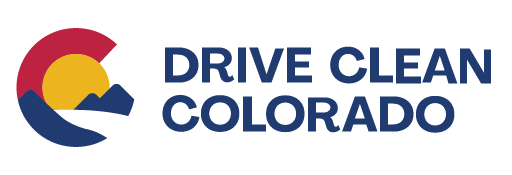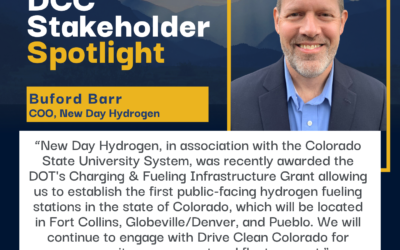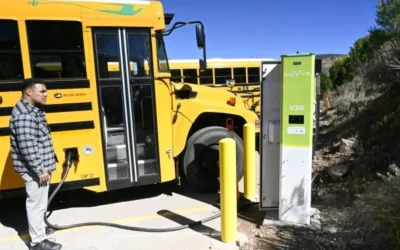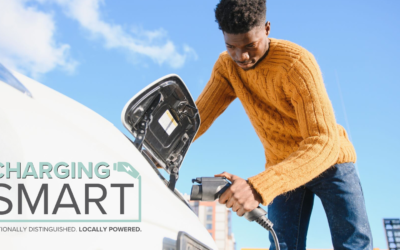Citizen’s Climate Lobby recently became a member and we are excited to welcome them to Denver Metro Clean Cities! CCL is a “nonprofit, nonpartisan, grassroots advocacy organization focused on national policies to address climate change solutions” and they have done amazing work in helping reduce carbon emissions through policy. We spoke with Julia Moravcsik, CCL’s Automotive Committee Resident Specialist in EVs, and she told us all about the great work she does and a policy initiative that CCL is currently working on. Keep reading to hear about this initative, what CCL hopes to accomplish in regards to emissions reduction and what you can do to help their efforts.
Organization: Citizen’s Climate Lobby 
Location: Coronado, CA
*Note: These answers are summarized from an interview with Julia Moravcsik from Citizen’s Climate Lobby
Can you introduce yourself and what you do at Citizen’s Climate Lobby?
I joined Citizen’s Climate Lobby (CCL) around 2 years ago and have been throwing myself into combating climate change, which is currently the biggest threat to humanity. The main reason I got involved with CCL is because of a bill they are working to pass that would impose a carbon fee on all carbon emission at its source – things like oil, gas and methane production. If this bill were passed, the carbon fee would increase over time, giving industries incentive to find cleaner solutions while also providing them with the time they need to do so. This increase in the fee would also cause the price of things like oil and gas to go up, but unlike other carbon tax initiatives, the money received from the fees as a result of the bill would go back to every American in the form of a monthly government check. Some carbon taxes out there have the money go to funding the green industry or something similar, but the chances of a bill like that getting passed are significantly decreased.
My interest and involvement in this bill came from looking at the associated statistics. This carbon fee and dividend is expected to lower emissions in the U.S. by 80 – 90%. Surprisingly, this bill is fairly bipartisan in nature and has garnished the support of 63% of Democrats and 55% of Republicans– there are no regulations, there is little government involvement, and it is a market-driven solution. By using a market-driven approach, we are making sure that corporations are paying what they need to be by pricing in a negative externality that they should be paying for anyway. Since we don’t have an actual bill right now, we call this the Carbon Fee & Dividend Policy – a federal level policy designed to reduce emissions at their source. There are lots of committees working on this and my major role right now is to collaborate with different industries to get endorsements for the bill and to encourage people to contact their local representatives and the White House and push this policy forward. Since I am on the automotive committee, this involves working specifically with auto makers and other people involved in the automotive industry (EV specialists, companies, clubs and parts manufacturers).

What does Citizen’s Climate Lobby’s work look like in Colorado?
CCL has 16 chapters around Colorado. Most of their work is to support state level bills that help with climate change and policy, like the Climate Action Plan to reduce pollution. This plan outlines a strategy to reduce carbon emissions by 16% by 2025 and 90% by 2050. It’s similar to the bill we are pushing at the federal level, but where the bill has a means of actually reducing emissions, the Climate Action Plan is more of a goalsetting endeavor.
What was your favorite project or accomplishment from 2020?
Last year was a bit of a slow year. We knew that the previous administration was going to end, so we spent 2020 building up a lot of support from industry, nonprofits, local governments and prominent individuals. CCL also won the Keeling Prize, an award named after scientist Chales David Keeling who was one of the first people to notice carbon levels in the atmosphere were increasing and started a carbon monitoring program as a result. This prize awards projects that have significant potential to reduce carbon emissions and we are very proud of all the climate work we have done that helped us accomplish this.
How is your work helping to advance clean transportation efforts in Colorado?
The Carbon Fee & Dividend Policy will have positive effects on clean transportation for the entire country, including Colorado. Given that internal combustion engine (ICE) cars run on gasoline and they use more fuel than necessary because they are inefficient, the total cost of ownership of electric vehicles relative to ICE vehicles will improve as a result of this bill. EV owners will save a significant amount of money each year compared to ICE vehicle owners because of the increase in gas prices due to the carbon tax. The question we need to ask is “Do people respond to gas prices?” – the answer is yes. The little ups and downs don’t affect much, but permanent increases result in people buying greener cars.
For people buying EVs for environmental reasons, it’s important to note that the bill will also help EVs become even cleaner as it will incentivize manufacturers and mining companies (who mine for materials in the car’s battery) to use renewable energy in lieu of fossil fuels. Mining companies tend to be conservative, and they don’t make big changes often. However, large mining companies exist that use 77% renewables, so it is possible for mines to operate on solar and wind. Traditionally, mining companies use diesel vehicles for operation inside the mines, resulting in a high rate of lung cancer in workers. With the carbon tax in place, mining companies will be more inclined to use electric vehicles for mine operations, which will improve the health of the workers and help reduce emissions. As an added benefit, after a mine is closed, any solar arrays used at the mine can be sold to nearby communities, allowing them to purchase inexpensive solar capabilities. As EVs become more popular because of increased gas prices, EV automakers will be incentivized to bring down the cost of manufacturing while improving EV efficiency – EVs will become smaller and more efficient as the innovation of batteries and aerodynamics improves.
You are a stakeholder at DMCC, how has that engagement helped you achieve your climate change goals?
We just recently became a stakeholder for DMCC, so we haven’t had much opportunity to take advantage of the partnership yet. That being said, we hope to use this engagement in the future to further CCL’s climate goals. Any endorsement like this is great because when we approach legislators with propositions like the Carbon Fee & Dividend Policy, they want to know who is behind us. If we can show that we have thousands of endorsers from industries and nonprofits, it gives us a great backing and people realize that we have a lot of support. CCL also does a lot of educating, and one thing I have personally gotten out of working with DMCC is their talent for education. A lot of times when I work with other organizations and listen to their meetings and presentations, their information tends to be abstract and high level. DMCC has a knack for being able to take these high-level issues and bring them down to wants and needs of communities and individuals. Things like the EV scavenger hunt and webinars about EV SPACS have a specific education style that I want to incorporate in my efforts.
Is there anything you want to talk about that we haven’t touched on?
I want to emphasize that right now, the federal administration is deciding on what our climate policy is going to be. This is an urgent time for trying to get the Carbon Fee & Dividend Policy into the mix of that discussion. We want to encourage people to contact the White House or their Congressional representatives in support of a carbon tax proposal like CCL’s. If we can get a lot of people to do that, it could push us over the edge of a tipping point and help get the bill passed.

See more DMCC Member Spotlights or learn more about joining DMCC today!






